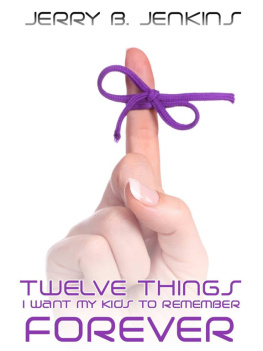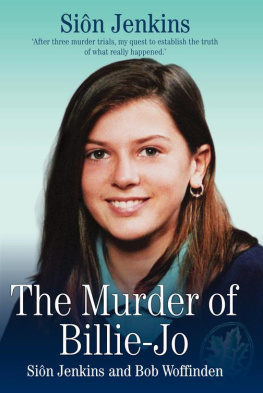Writing
for the Soul
Instruction and Advice
from an Extraordinary Writing Life
Jerry B.
Jenkins
Author of the Left Behind Series
Foreword by Francine Rivers
First published in the US, 2006 by Writers Digest Books
2012 by Jerry B. Jenkins
Smashwords Edition
TO MY WRITING MENTORS
Bonita Jenkins
Richard Carey
Henry Roepken
Linda Hamilton
Stanley Baldwin
Roy Carlisle
and Sol Stein
I met Jerry Jenkins shortly after I signed with Tyndale House Publishers, and the Left Behind phenomenon had not yet happened. Jerry was gracious and encouraging. Over the years, the astounding success of the Left Behind series has not changed him adversely in any way I can see. Admirably, Jerry has risen to the great responsibility his blessings carry, and he has tirelessly encouraged new writers to raise the standard and spread the Gospel through the art of writing. We know it is one thing to be a Christian who writes, and quite another to be a Christian writer. Though this book offers advice and encouragement to both, the heartbeat is to a higher calling, one that will open hearts and minds to a relationship with Jesus and the quest for excellence that will bring praise to our Lord and Savior.
The writing life offers challenges beyond merely learning the craft. Writing for the Lord adds complexities to those challenges. All too often, Christians are seduced by working for the Lord, setting aside the more important relationship with Him in their pursuit to serve Him. What I find most inspiring about Jerry Jenkinss Writing for the Soul is his determination and success in keeping his priorities. Love and serve the Lord, and remember He has given you a family to love and serve as well. Jerry made a decision early in his career to put family ahead of writing projects. By the sheer number of newspaper and magazine articles, biographies, nonfiction, and fiction books he has written, I believe the Lord has honored Jerry for that choice, and multiplied his energies.
With his easy flowing, conversational style, always laced with his signature good humor, Jerry shares knowledge gained through a lifetime of hard work writing everything from columns to best-selling novels, many of which have been translated into numerous languages and have sold many millions of copies. His stories have changed lives and hearts around the world. He shares his struggles openly, and by his humble example, inspires us with what the Lord has done through him. He entertains us with anecdotes about the people he has met, often American icons who prove to be as human as the rest of us.
You will enjoy reading this book. From the first page, you will be tempted to put your feet up and drink it in with one pleasurable swallow. Dont. Instead, savor it. Keep pen and paper by your side. There are treasures here; sparks to light the fire, and to keep it burning.
Francine Rivers
Author of Redeeming Love
INTRODUCTION
BIG DOOR ON A SMALL HINGE
So there I sat, writing awayas I had nearly every day for more than twenty yearswhen Rick Christian called. He was my agent.
I liked the sound of having an agent and worked it into as many conversations as possible. I had written and published ninety books before even considering an agent, and to my mind I was already living a writers dream. While mainstream fiction was my love, Id made a healthy six-figure income largely by writing famous peoples stories. These hadnt been ghost jobs. My name had appeared on the covers of biographies and autobiographies of many luminaries. But of course, the average reader doesnt notice the name of a faceless writer, and more than once I was asked if I had read a certain bookwhen I had written it. I was the most famous author no one had ever heard of. Having an agent and being able to say My agent this and My agent that should have lent some credibility to my invisible career, but more likely it repulsed even those who loved me.
Well, the clich is that big doors turn on small hinges, and the small hinge that day was Rick Christians call. He had no more idea than I did what would come of that short conversation. To the best of my memory, it went like this:
Have you ever met Tim LaHaye?
No, I said. Familiar with him, of course.
I knew Dr. LaHaye not only as a former pastor and a bestselling nonfiction writer, but also as an outspoken conservative polemic, big on the study of temperaments, sexuality in the Christian marriage, politics, Christian education, and prophecy. In a former life, as editor of an inspirational knockoff of TV Guide, I had assigned and published a cover story on Dr. LaHaye and had also used him as a columnist.
You need to meet him, Rick said. I represent him, and he has a great novel idea.
Well, doesnt everybody?
The fact was, I wanted to meet Dr. LaHaye. I had a few doubts about anyones great novel idea, but Rick Christian has always had an eye for good stuff, and both he and LaHaye were willing to come my way and meet me at a hotel near OHare Field in ChicagoRick from Colorado, Dr. LaHaye from California.
The idea proved simple, yet profound. Dr. LaHaye had come up with the idea while flying to a prophecy conference, where he was to speak about his view of the end times, based on his largely literal interpretation of the Bible. (He had written nonfiction books on the subject, and they had enjoyed strong sales.) He saw the pilot emerge from the cabin and flirt with a flight attendant, and he noticed that the captain wore a wedding ring and the attendant did not. The kernel of a plot came to Dr. LaHaye in an instant. He wondered, what if the Rapture occurred right then, and a certain percentage of the people aboard that plane simply vanished in an instant, leaving everything material behind? And what if that pilots wife was a Christian believer who had talked to him about anticipating that very event?
The notion of fictionalizing an account of the Rapture and those left behind was not entirely new. It had been done a few times, and while always fascinating and popular, the results had rarely done justice to the magnitude of the story. While I loved the idea and the scene Dr. LaHaye described for an opener, my fear was that there was a fine line between drama and schlock.
What impressed me most that day, however, was Dr. LaHaye himself. Already in his late sixties, he was trim, taut, and energetic, full of enthusiasm and passion. He wanted to see this story told in novel form, he said, because fiction is what most people seem to want to read.
Im neither a theologian nor a scholar, but I am an evangelical who was raised in churches that believed in this future event. If I were to attempt this, I said, who would be my target audience? People who agree with us and would be encouraged by this, or the uninitiated we would be trying to persuade?
Both, he said, beaming.
Charming, but not literarily sound. A double-minded book is unstable in all its ways, I said, parodying a Bible verse that says the same about a double-minded person. I had always written to a single audience at a time, and I urged Dr. LaHaye to choose one.
He wanted to encourage believers and persuade unbelievers, a loftyif unrealisticgoal. I was confident that, by the time I sat before the computer, I would have persuaded Dr. LaHaye to pick one audience.
Dr. LaHaye and I parted that day agreeing that I would run with the idea and attempt to create a sample first chapter and synopsis that Rick could shop to publishers. Dr. LaHaye would serve as theological expert and prophecy consultant and would not attempt to co-write. I would defer to him on the theology, and he would defer to me on the writing. If the thing sold, wed split everything fifty-fifty, minus Ricks commission, of course.
Next page







